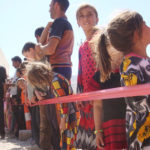KABUL, Afghanistan—Plastic surgeon Keith Rose does more than reconstruct bones and tissue. He changes lives every time he returns to a hospital in Kabul, Afghanistan.
With a focus on curable conditions, Rose—a Baylor University alumnus—works with faith-based organization Cure International in a fusion of medical and spiritual ministry to “make all things new” for residents of developing countries.
|
Plastic surgeon Keith Rose, a Baylor University alumnus, returns to Kabul, Afghanistan, several times a year from his home in Corpus Christi to treat patients with congenital defects clubfoot, or cleft lip or palate, as well as burn victims. (Photos courtesy of Keith Rose)
|
When mentor and former Baylor football coach Grant Teaff heard about Rose’s career overseas, he wasn’t surprised.
“He was always encouraging his teammates, on the field specifically. I can’t ever remember him doing anything in a negative way,” said Teaff. “You could tell … he had a depth. You didn’t know where it would lead.”
Rose’s life-giving attitude led to his work in international medicine, inspired by mission trips abroad with his father, pastor of a nondenominational church in Kingsland and formerly pastor of a Baptist church in New York.
As a surgeon with Cure International, Rose uses his medical training to offer hope and restoration through affordable specialized surgery.
Rose returns to Kabul several times a year from his home in Corpus Christi to treat primarily those patients with congenital defects clubfoot, or cleft lip or palate. He also treats burn victims.
Curing children with birth defects quite literally offers them new life, even when the defect isn’t debilitating, Rose said.
“Essentially, if you have a cleft lip or palate and live in Afghanistan, you have to go to Pakistan to get it taken care of,” Rose explained.
Sign up for our weekly edition and get all our headlines in your inbox on Thursdays
“The girls can’t get married, the boys can’t go to school—the kids can be pretty brutal towards one another and just don’t accept deformity. It’s just a big need with a lot of work to do.”
Rose’s work with Cure International represents part of the organization’s broad mission to treat the 125 million children in developing countries who can be cured completely. The organization offers treatment for “hydrocephalus (fluid in brain cavities) … spina bifida and other spinal deformities, and crippling orthopedic conditions,” according to their website at helpcurenow.com.
For Rose, curing clubfoot holds personal significance.
“One of my twins was born with clubfoot, and at the appropriate time, we had the surgery done. He’s walking around normally now,” Rose said.
“I don’t understand what it would be like to have a child with a deformity that they never even know can be fixed … But there are people in their 40s and 50s who’ve never had it treated.”
Since Cure International founder Scott Harrison recognized healing involves more than just physical restoration, the organization takes a “50/50 medical-spiritual” approach.
“The spiritual dimension of healing and the medical/physical dimension are parts of the same process,” Harrison said.

As a surgeon with Cure International, Baylor University alumnus Keith Rose of Corpus Christi uses his medical training to offer hope and restoration in Afghanistan through affordable specialized surgery.
|
“We have an executive director, a spiritual director, and a medical director at each hospital. We want to make sure people know we’re more than just a medical organization,” Cure communications director Lisa Wolf said.
“Our spiritual ministry is equally as important as our medical ministry.”
Even though Cure is the largest provider of specialized surgery in the Third World, in many countries, it’s often the only provider.
“It’s faint praise to us that we’re the largest provider of this kind of service in the developing world—no one else is really out there doing it,” Harrison said.
One of the biggest obstacles for Cure is simple advertisement of their services, Harrison explained.
“The family just can’t believe there’s someone there to care for them. Just getting the word out is important.”
Several parents even delay naming their children for fear they won’t survive, Rose said.
Despite the daunting need, Cure has made an enormous impact in ministry to the disabled, having seen more than 700,000 patients and performed about 47,000 surgeries in 12 different countries in the past ten years. Wolf told of a man in Uganda who discovered a different kind of compassion with Cure, saying, “No white man has ever wanted to touch my baby.”
Even though cultural sensitivity prevents some kinds of evangelism in certain countries—like Afghanistan—Cure doctors generously offer care and love to patients who rarely experience that attention, Wolf noted.
Besides giving direct medical treatment, Cure also equips Third World doctors with advanced medical training so they can continue the work themselves. Rose teaches his surgeons and doctors participating in the obstetrics and gynecology fellowship how to use modern medical technique and instruments.
He’s just living out some advice from another Baylor mentor, former physiology professor Ray Wilson.
“I had a wonderful teacher (Wilson) who really inspired me to travel. He always told me, ‘Everything you learn, you have responsibility to give back,’” Rose said.
In his work with Cure, as he teaches and heals, Rose has been able to fulfill that responsibility—and beyond.
“When (Rose) leaves our hospital in Afghanistan, the level of confidence in our doctors has always been increased,” said Harrison. “He’s a superb teacher.”














We seek to connect God’s story and God’s people around the world. To learn more about God’s story, click here.
Send comments and feedback to Eric Black, our editor. For comments to be published, please specify “letter to the editor.” Maximum length for publication is 300 words.